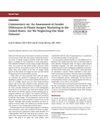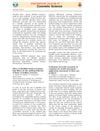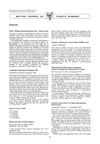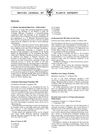 January 2019 in “Current research in diabetes & obesity journal”
January 2019 in “Current research in diabetes & obesity journal” A woman with type 2 diabetes developed alopecia areata, suggesting a link between the two autoimmune conditions.
 November 2018 in “Annals of oncology”
November 2018 in “Annals of oncology” A scalp-cooling system effectively prevents hair loss in breast cancer patients treated with eribulin.

The document recommends a multidisciplinary approach and experience sharing to advance facial feminization surgery as a medical field.
[object Object]  January 2017 in “Chemistry & Industry”
January 2017 in “Chemistry & Industry” Eating fewer calories may slow aging and removing old cells can increase lifespan in mice.
 November 2015 in “Aesthetic Surgery Journal”
November 2015 in “Aesthetic Surgery Journal” Plastic surgery marketing in the U.S. often overlooks men, but targeted campaigns can significantly increase male clientele for cosmetic procedures.
 March 2010 in “International Journal of Cosmetic Science”
March 2010 in “International Journal of Cosmetic Science” Disulfide bonds affect the melting behavior of hair's crystalline structure, but hair retains some stability even after these bonds are broken.
 July 1998 in “British Journal of Plastic Surgery”
July 1998 in “British Journal of Plastic Surgery” Upcoming events and courses in plastic surgery were announced.
 January 1998 in “Journal of Dermatological Treatment”
January 1998 in “Journal of Dermatological Treatment” The document recommends all three dermatology books for a library, noting their detailed content but also suggesting improvements in clarity and consistency.
 December 1997 in “British Journal of Plastic Surgery”
December 1997 in “British Journal of Plastic Surgery” The document lists plastic surgery events and opportunities from 1997, including awards, workshops, and conferences.
 May 1985 in “Journal of The American Academy of Dermatology”
May 1985 in “Journal of The American Academy of Dermatology” The book "Diseases of the Hair and Scalp" has outdated information and confusing content, but may still offer some insights.
 2295 citations,
August 2012 in “The international journal of transgenderism/International journal of transgenderism”
2295 citations,
August 2012 in “The international journal of transgenderism/International journal of transgenderism” The guidelines recommend informed consent for gender-affirming treatments and stress the importance of personalized, culturally sensitive care for transgender individuals.
[object Object]  855 citations,
June 2009 in “The Journal of Clinical Endocrinology & Metabolism”
855 citations,
June 2009 in “The Journal of Clinical Endocrinology & Metabolism” The guideline recommends mental health involvement in diagnosing gender identity disorder and outlines hormone and surgical treatment protocols, emphasizing safety, informed consent, and long-term monitoring.
 475 citations,
January 2016 in “International Review of Psychiatry”
475 citations,
January 2016 in “International Review of Psychiatry” The document concludes that non-binary individuals need compassionate support and recognition in healthcare, without being pathologized.
 238 citations,
July 2003 in “British Journal of Plastic Surgery”
238 citations,
July 2003 in “British Journal of Plastic Surgery” Hidradenitis suppurativa, a chronic skin disease, can be managed with antibiotics, lifestyle changes, and in severe cases, surgery. Early diagnosis and careful planning are key, and laser treatment can be an efficient solution for mild to severe cases.
 237 citations,
January 2010 in “The Journal of Sexual Medicine”
237 citations,
January 2010 in “The Journal of Sexual Medicine” The report recommends personalized treatment for women's sexual dysfunctions and more research on effective therapies.
 179 citations,
October 2018 in “American Journal of Clinical Dermatology”
179 citations,
October 2018 in “American Journal of Clinical Dermatology” Cancer treatments targeting specific cells and the immune system can cause skin, mouth, hair, and nail problems, affecting patients' quality of life and treatment adherence.
 177 citations,
July 2004 in “The Journal of Sexual Medicine”
177 citations,
July 2004 in “The Journal of Sexual Medicine” Experts recommend thorough medical, sexual, and psychosocial assessments for women's sexual dysfunctions, and suggest individualized treatment plans with regular check-ups. They also mention potential use of estrogen and androgen therapy, but with caution due to safety concerns.
 159 citations,
September 2001 in “European Journal of Cancer Care”
159 citations,
September 2001 in “European Journal of Cancer Care” Chemotherapy-induced hair loss significantly affects patients' well-being, and nurses are key in helping them cope, but more research is needed to find effective treatments.
 157 citations,
May 2021 in “Endocrine Reviews”
157 citations,
May 2021 in “Endocrine Reviews” Early diagnosis and individualized treatment improve outcomes for Congenital Adrenal Hyperplasia.

Dermatoscopy and videodermatoscopy are useful for diagnosing and monitoring various skin, hair, and nail conditions.
 155 citations,
March 2006 in “The American Journal of Medicine”
155 citations,
March 2006 in “The American Journal of Medicine” Women with PCOS have heart-related issues not because of obesity, but due to insulin resistance and low adiponectin levels.
 151 citations,
February 2007 in “International Journal of Dermatology”
151 citations,
February 2007 in “International Journal of Dermatology” Alopecia areata causes hair loss, has no cure, and various treatments exist.
 131 citations,
August 2000 in “International Journal of Dermatology”
131 citations,
August 2000 in “International Journal of Dermatology” Inflammation may be linked to hair loss, and targeting specific enzymes could help treat it.
 130 citations,
August 2020 in “Drug Design Development and Therapy”
130 citations,
August 2020 in “Drug Design Development and Therapy” Nanoparticles can improve skin drug delivery but have challenges like toxicity and stability that need more research.
 129 citations,
January 2009 in “International Journal of Trichology”
129 citations,
January 2009 in “International Journal of Trichology” Trichoscopy can diagnose female hair loss with high accuracy by looking for specific patterns in hair and scalp appearance.
 126 citations,
February 2017 in “JAMA Surgery”
126 citations,
February 2017 in “JAMA Surgery” Surgeons must understand the full care process for gender confirmation surgery to help transgender individuals effectively.
 126 citations,
October 1983 in “Journal of The American Academy of Dermatology”
126 citations,
October 1983 in “Journal of The American Academy of Dermatology” Isotretinoin effectively treats severe acne and similar conditions, but has common, mostly reversible side effects, requiring careful patient monitoring.
 108 citations,
December 2003 in “Lasers in surgery and medicine”
108 citations,
December 2003 in “Lasers in surgery and medicine” ICG-enhanced NIR laser therapy may be a promising acne treatment with improvement and no side effects.
 105 citations,
February 2011 in “The Journal of Clinical Endocrinology & Metabolism”
105 citations,
February 2011 in “The Journal of Clinical Endocrinology & Metabolism” Treating sleep apnea in young obese women with PCOS can improve heart health and insulin sensitivity.
 103 citations,
December 2011 in “Journal of the American Academy of Dermatology”
103 citations,
December 2011 in “Journal of the American Academy of Dermatology” Chemotherapy often causes temporary hair loss, which is distressing and needs better treatment and support.






























